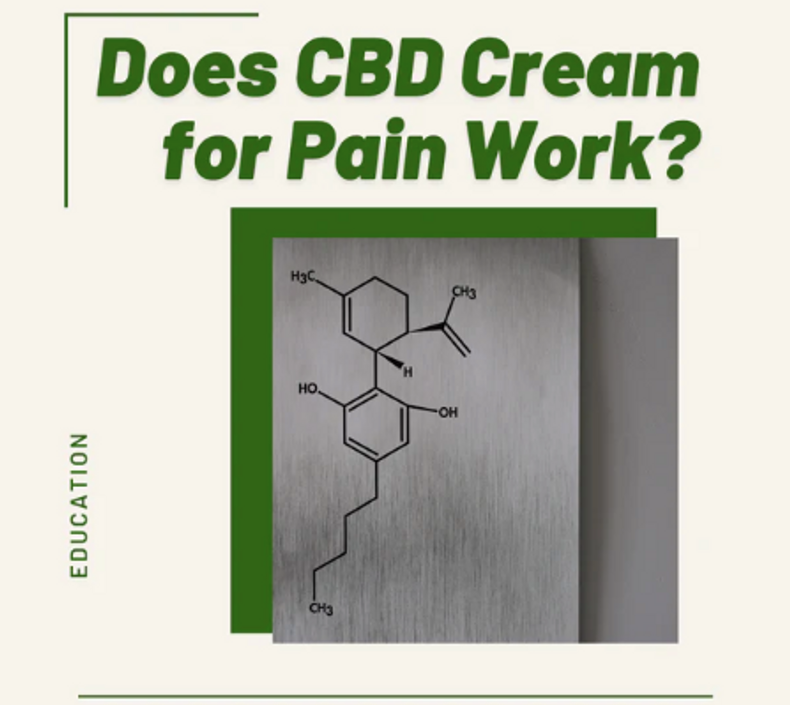
Does CBD Cream for Pain Work?
CBD (cannabidiol) cream is skyrocketing in popularity these days. The main reason people use it is to relieve pain and inflammation. Even though CBD products have been around for a few years, they still tend to get a bad rap because people confuse CBD with THC and are concerned the product may induce a high.
However, legal CBD products such as those found at Happy Trails do not contain a sufficient amount of THC, so getting ‘stoned’ is not a reality.
CBD is a cannabinoid that is not psychoactive, and it works in the body by binding to receptors called endocannabinoid receptors. Just like we have an immune system, we also possess what is known as an endocannabinoid system. This regulatory system of the body is responsible for healthy immune system functioning and regulating pain, inflammation, sleep, emotions, gut health, blood pressure, cardiovascular health, and so much more. Learn more about the ECS and how CBD works by reading The Science Behind CBD. So, what is CBD’s potential role in relieving pain?
The Role of CBD in Relieving Pain
The number of studies looking at CBD and its role in relieving pain is limited. However, there are animal studies that do show benefits. One study found that mice who had lab-induced osteoarthritis of the knee experienced less inflammation in their knee joints and fewer signs of pain or limitation when CBD was locally injected into the area of inflammation (1). Another similar study found rats who received CBD also experienced less inflammation in their knee joints (2).
These results are encouraging, but few studies are looking at whether topical use of CBD relieves inflammation. Now let’s take a look at different scenarios in which CBD can be used for pain.
Types of Pain CBD May Alleviate
Let’s look at neuropathic pain, pain that comes from nerve inflammation or damage. It's a complicated type of pain to treat. A study published in the Journal of Experimental Medicine found that cannabinoids bind to receptors called alpha-3 glycine receptors that help reduce neuropathic pain (3).
Other Pain Conditions That CBD Cream May Be Benefit
We know from personal experience and working with many customers over the years that topical products help alleviate localized acute pain. Our customer favorites are RE's Arnica Hemp Muscle Relief Salve, Mary’s Muscle Freeze and Melt CBD Lotion. Topicals tend to work quickly and can be applied as frequently as necessary.
Among our customers are amazing nurses with never-ending days, people with labor-intensive jobs (hello construction workers!), and many different types of athletes. From muscle strains to muscle spasms, these people encounter it all. Although few studies are looking at the effects of topical CBD on muscle spasms, one study did find that it may be beneficial for treating muscle spasms in people with multiple sclerosis (site). We think it is worth a try.
Tolerance Isn't a Problem with CBD Cream.
As many of us know, a significant problem with pain medications is addiction and tolerance, leading to the need to take more medication to achieve the same level of pain relief. Research shows that people are unlikely to develop tolerance to CBD! When you combine this with the preliminary studies that show CBD may reduce inflammation and pain, along with testimonials from real people, it seems CBD is a tremendous potential treatment for specific pain conditions without the downside of tolerance and addiction.
It has been amazing to witness so many customers reaching for CBD, and many of them have been able to veer away from prescription pain meds. Our friend Stephanie is a testament to this. CBD helps her manage her chronic (and we mean chronic) pain, and consistent use has helped her get off meds like Vicodin and Fentanyl. Read her remarkable comeback story here.
This is excellent news, but is CBD cream safe in all other regards?
Is CBD Cream Safe?
Researchers are still looking at the long-term effects of using CBD. So far, there are few risks of using it short-term. One concern is that it may interact with some medications, but this is more of a concern with CBD products taken internally. It's not clear how much CBD you absorb into your bloodstream when you use CBD cream. However, it’s a good idea to consult your doctor before using it if you're taking other medications. If you need additional help, just call a Happy Trails consultant, and we will be happy to share our knowledge on potential drug interactions.
Another safety factor has to do with the purity and quality of the CBD product you choose. The FDA doesn't regulate CBD products like it does medications. Be sure to select reputable companies that are transparent in what their products contain. All products of Happy Trails are third-party tested so that purity and potency are verified.
Closing Thoughts
If you have any questions or need help choosing a product, we’d love to help you at any of our locations! Alternatively, please send us a Facebook message or give us a call. Please find all of our info on our website: HappyTrailsCBD.com.
References:
- Philpott HT, O'Brien M, McDougall JJ. Attenuation of early phase inflammation by cannabidiol prevents pain and nerve damage in rat osteoarthritis. Pain. 2017;158(12):2442-2451. doi:10.1097/j.pain.0000000000001052.
- Hammell DC, Zhang LP, Ma F, et al. Transdermal cannabidiol reduces inflammation and pain-related behaviors in a rat model of arthritis. Eur J Pain. 2016;20(6):936-948. doi:10.1002/ejp.818.
- MedicalNewsToday.com. "Does CBD oil work for chronic pain management?"
- Meng, Howard MD*; Johnston, Bradley PhD†‡§‖; Englesakis, Marina MLIS¶; Moulin, Dwight E. MD#; Bhatia, Anuj MBBS, MD, FRCPC, FRCA, FFPMRCA, FIPP, EDRA, CIPS* Selective Cannabinoids for Chronic Neuropathic Pain: A Systematic Review and Meta-analysis, Anesthesia & Analgesia: November 2017 - Volume 125 - Issue 5 - p 1638-1652.
- Arthritis.org. "CBD for Arthritis Pain: What You Should Know"
- Reggio PH. Endocannabinoid binding to the cannabinoid receptors: what is known and what remains unknown. Curr Med Chem. 2010;17(14):1468-1486. doi:10.2174/092986710790980005.
- Front. Pharmacol., 13 November 2018 | https://doi.org/10.3389/fphar.2018.01259. Cannabinoids and Pain: New Insights From Old Molecules.
- Xiong W, Cui T, Cheng K, et al. Cannabinoids suppress inflammatory and neuropathic pain by targeting α3 glycine receptors. J Exp Med. 2012;209(6):1121-1134. doi:10.1084/jem.20120242.

